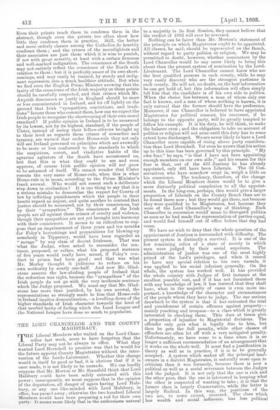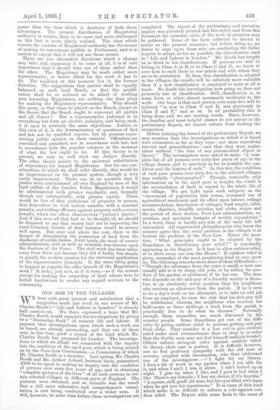THE LORD CHANCELLOR AND THE COUNTY MAGISTRACY.
TI1HE Liberal Members who waited on the Lord Chan- cellor last week, seem to have forgotten that the Liberal Party may not be always in office. What they wanted Lord Herschell to promise was that he would for the future appoint County Magistrates without the inter- vention of the Lords-Lieutenant. Whether this change would in itself be good or bad, it is obvious that if it is once made, it is not likely to be unmade. We can hardly suppose that Mr. Morton or Mr. Stansfeld think that Lord Halsbury could have been safely entrusted with this power ; consequently, we must suppose that in the opinion of the deputation, all danger of again having Lord Hals- bury, or any one like-minded with Lord Halsbury, in office, has passed away ; otherwise the two hundred Liberal Members would have been preparing a rod for their own party. It seems more likely that in the enthusiasm natural TI1HE Liberal Members who waited on the Lord Chan- cellor last week, seem to have forgotten that the Liberal Party may not be always in office. What they wanted Lord Herschell to promise was that he would for the future appoint County Magistrates without the inter- vention of the Lords-Lieutenant. Whether this change would in itself be good or bad, it is obvious that if it is once made, it is not likely to be unmade. We can hardly suppose that Mr. Morton or Mr. Stansfeld think that Lord Halsbury could have been safely entrusted with this power ; consequently, we must suppose that in the opinion of the deputation, all danger of again having Lord Hals- bury, or any one like-minded with Lord Halsbury, in office, has passed away ; otherwise the two hundred Liberal Members would have been preparing a rod for their own party. It seems more likely that in the enthusiasm natural to a majority in its first Session, they cannot believe that the verdict of 1892 will ever be reversed.
Nothing can be fairer than Mr. Morton's statement of the principle on which Magistrates ought to be appointed. All classes, he said, should be represented on the Bench, without regard to party politics or religion. We may be permitted to doubt, however, whether nomination by the Lord Chancellor would be any more likely to bring this about than the present system of nomination by the Lord- Lieutenant. The Lord Chancellor cannot know who are the best qualified persons in each county, while he may very easily discover who are the strongest partisans in each county. He will act, no doubt, on the best information he can get hold of, but this information will often simply tell him that the candidate is of his own side in politics. When the choice lies between a man of whom only one fact is known, and a man of whom nothing is known, it is only natural that the former should have the preference. Moreover, if one Chancellor is believed to have appointed Magistrates for political reasons, his successor, if he belongs to the opposite party, will be greatly tempted to follow his example. It is his duty, he will think, to make the balance even ; and the obligation to take no account of politics or religion will not arise until this duty has to some extent been discharged. We are never likely to have a Lord Chancellor more capable of rising above party considera- tion than Lord Herschell. Yet even he avows that his action up to this time has been governed by this principle. "My own fear," he says, "is that I have not been appointing enough members on our own side ;" and his reason for this fear is that, out of the 433 Justices he has already appointed, only 401 have been Liberals. The 32 Con- servatives who have somehow crept in, weigh a little on his conscience. The tendency, therefore, of the change which the Liberal Members desire would be to give a more distinctly political complexion to all the appoint- ments. In the long-run, perhaps, this would give a larger proportion of Liberals on the County Bench than are to be found there now ; but they would get there, not because they were qualified to be Magistrates, but because they were of the Lord Chancellor's way of thinking. Each Chancellor in succession woulcr mean to disregard politics as soon as he had made the representation of parties equal, and would find himself out of office before that day had come.
We have no wish to deny that the whole question of the appointment of Justices is surrounded with difficulty. The present system is distinctly a survival. It is one of the few remaining relics of a state of society in which men were judged by their social superiors. The administration of justice was one of the most highly prized of the lord's privileges, and when it ceased to have any special relation to his own vassals, it was applied to his social inferiors generally. On the whole, the system has worked well. It has provided the whole country with Judges of first instance at the smallest possible cost, and if it has not furnished them with any knowledge of law, it has insured that they shall have, what in the majority of cases is even more im- portant, a knowledge of the character and circumstances of the people whom they have to judge. The one serious drawback to the system is that it has entrusted the trial and punishment of certain offences against property— mainly poaching and trespass—to a class which is greatly interested in checking them. This does at times give a proportion of injustice to Magisterial decisions. The offender only gets what is legally due to him, but then he gets the full penalty, while other classes of offenders are often let off with a very mitigated penalty. Unfortunately, we have come to a time when it is no longer a, sufficient recommendation of an arrangement that it works on the whole well. It must find a justification in theory as well as in practice, if it is to be generally accepted. A system which makes all the principal land- owners in a district Magistrates, is naturally more open to criticism than it was formerly, because there is now a political as well as a social severance between the Judges and the judged. It is not only that the one is rich and the other poor, that the one is interested in keeping what the other is suspected of wanting to take ; it is that the former class is largely Conservative, while the latter is largely Radical. In this way, the positions of the two are, to some extent, reversed. The class which has wealth and social influence, has less political power than the class which is destitute of both these advantages. The present distribution of Magisterial authority is certain, then, to be more and more challenged as this fact is more clearly realised. The class which resents the exercise of Magisterial authority has the means of making its resentment audible in Parliament, and it is useless to expect that it will not use those means. There are two alternative directions which a change may take, and, supposing it to come at all, it is of vast importance that it should take one of these rather than the other. The Magistracy may be made either more representative, or better fitted for the work it has to do. The tendency at this moment lies in the former direction. The suggestions that parties shall be equally balanced on each local Bench, or that the qualifi- cation shall be so reduced as to admit of working men becoming Magistrates, are nothing else than pleas for making the Magistracy representative. Why should this party, or that class, be placed on the Bench, except .on the theory that the Bench ought to represent i all pestle s and all classes ? But a representative judiciary is n everything but form an elective judiciary, and being isuch , it is open to precisely the same objections. Justice, n this view of it, is the determination of questions of fact and law, not by qualified experts, but by persons repre- senting public opinion on these matters. Offenders are convicted and punished, not in accordance with law, but in accordance with the popular estimate at the moment i of what the law ought to be. If this theory s to prevail, we may as well elect our Judges directly. The other theory points to the universal substitution of stipendiary for unpaid Magistrates. But for one con- sideration, to which we shall refer directly, this would be an improvement on the present system, though a very costly improvement. There can be no question that if jiistice were administered all over England by men of the legal calibre of the London Police Magistrates, it would be administered with greater regularity, and, formally though not substantially, with greater equity. There would be less of that preference of property to person, that disposition to visit violent assaults with a nominal penalty, and trifling offences against property with a severe penalty, which too often characterises "justice's justice." And if this were all that had to be thought of, we should be disposed to say that money laid out in improving the rural Criminal Courts of first instance would be money well spent. But over and above the cost, there is the danger of dissociating the possession of land from the discharge of public duties. Until lately, the work of county administration, civil as well as criminal, was thrown upon the Justices of the Peace. The civil work has been taken away from them not because they did it badly, but simply to gratify the modern passion for the universal application of the representative principle. Is the same thing going to happen as regards the other branch of the Magistrate's work ? It looks, just now, as if it were,—as if the newest receipt for making the ownership of land odious were to forbid landowners to render any unpaid services 'to the community.



































 Previous page
Previous page